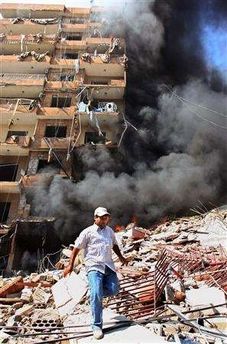 BEIRUT (Reuters) – Sunday August 6, Hizbollah killed 10 Israeli soldiers on Sunday in its deadliest rocket strike yet and Israeli bombs killed 11 Lebanese civilians as Lebanon rejected a draft U.N. resolution to end the 26-day-old war. The soldiers were killed and nine were wounded, medics said, when a rocket struck a group of reservists called up for the Lebanon offensive in the north Israeli village of Kfar Giladi. Soldiers near the scene held their heads and one wept as a military ambulance pulled away. Helicopters landed nearby to fly the badly wounded to hospitals further from the war front.
BEIRUT (Reuters) – Sunday August 6, Hizbollah killed 10 Israeli soldiers on Sunday in its deadliest rocket strike yet and Israeli bombs killed 11 Lebanese civilians as Lebanon rejected a draft U.N. resolution to end the 26-day-old war. The soldiers were killed and nine were wounded, medics said, when a rocket struck a group of reservists called up for the Lebanon offensive in the north Israeli village of Kfar Giladi. Soldiers near the scene held their heads and one wept as a military ambulance pulled away. Helicopters landed nearby to fly the badly wounded to hospitals further from the war front.
Blood-stained boots stood against a wall. Stretchers lay on the ground, covered in blood. One officer looked at the bodies, some covered by blankets, and shook his head in disbelief. "I don’t recall so many dead ever. This is terrible," said Ron Valensi, head of the upper Galilee municipal council and a resident of Kfar Giladi, speaking on Channel 2 Television. Lebanon’s parliament speaker Nabih Berri said his country rejected the U.S.-French draft Security Council resolution because it would let Israeli forces stay on Lebanese soil.
President of the parliament Berri, said the draft ignored the Beirut government’s seven-point plan calling for a ceasefire, the withdrawal of Israeli forces and the return of all displaced civilians among other things. "All of Lebanon rejects any resolution that is outside these seven points," Berri told a news conference. U.S. Secretary of State Condoleezza Rice said it was important to get a vote on a U.N. resolution in the next day or two to clear the way for a halt to large-scale violence in southern Lebanon.
Hizbollah, has killed 56 Israeli soldiers and 33 civilians in the conflict, sparked when its men snatched two Israeli soldiers in a cross-border raid on July 12.
The Israeli army said on Sunday it had captured one of the Hizbollah fighters who took part in the seizure of the soldiers.
LEBANESE CIVILIANS KILLED
At least 748 people have been killed in Lebanon during the war, including five who died in air raids on the Shi’ite village of Ansar overnight. Three civilians were killed in a strike near the southern village of Naqoura, security sources said.
Two more civilians died when an Israeli air strike hit a pickup truck driving about 40 metres ahead of a U.N. aid convoy heading for the southern city of Tyre, U.N. sources said. A Lebanese army soldier was killed in an air raid near Tyre and another civilian in a strike inside it.
U.N. peacekeepers in south Lebanon said a mortar round fired by Hizbollah wounded three Chinese members of the force.
Israel views the U.N. draft favourably, a senior government official and Israeli media said, noting that it allowed Israel to respond to Hizbollah attacks after a truce and did not order Israel to withdraw its 10,000 soldiers from southern Lebanon.
Israel wants its troops to remain until an international force can take over. Hizbollah says it will keep fighting until Israel stops bombing Lebanon and withdraws all its forces.
Israeli Prime Minister Ehud Olmert told ministers at a routine cabinet meeting not to speak about the document until it was finalised, a political source said.
The draft was hammered out in negotiations between the United States, Israel’s main ally, and France, touted as leader of the anticipated international force for Lebanon.
Israeli Justice Minister Haim Ramon said Israel would keep attacking Hizbollah targets in Lebanon and its soldiers would stay there until the international force arrived.
"We must continue the fighting, continue to hit whoever we can hit from Hizbollah," Ramon told Army Radio.
Israel’s definition of Hizbollah targets has included more than 70 bridges, as well as roads, ports, airports, radar stations, television and telephone masts, factories, farms and countless homes pummelled into ruin by bombing across Lebanon.
A second U.N. resolution is envisaged a week or two after the first is adopted, setting conditions for a permanent ceasefire and authorising the international force.
Berri said the first draft resolution would "drop Lebanon into internal strife or be impossible to implement".
Lebanon will seek support for its position from Arab foreign ministers due to meet in Beirut on Monday. Syrian Foreign Minister Walid Mouallem, arriving by land a day early, reiterated that Syria would respond if Israel attacks it.
The war coincides with an Israeli military offensive in the southern Gaza Strip to recover another captured soldier.
An air strike killed one Palestinian in the strip on Sunday, bringing to at least 167 the number of Palestinians killed in the campaign, more than half of them civilians.
In the West Bank city of Ramallah, Israeli forces detained Palestinian parliament speaker Aziz Dweik, a Hamas leader.
(Additional reporting by Beirut, Jerusalem and United Nations bureaux)



